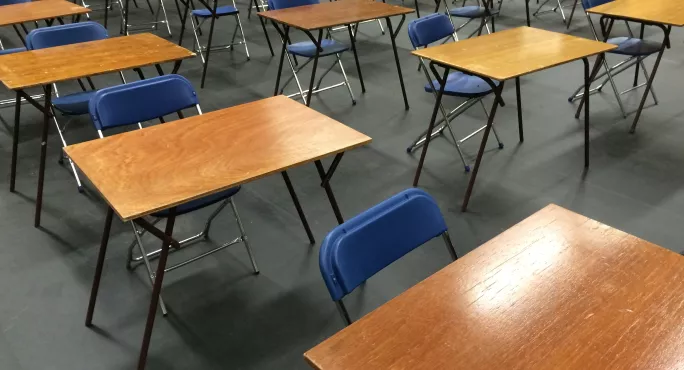Ministers should reform “old-fashioned” GCSEs in the long term, an influential private school leader has said.
It would be “timely” for the government to consider changing the national assessments at age 16 and look at their future relevance, according to Jane Prescott, headmistress of Portsmouth High School.
IGCSEs 2021: Cambridge Assessment could scrap UK exams
Exams 2021: OxfordAQA cancels IGCSE and IA levels
Assessment: International schools split on exams plans
Ms Prescott, president of the Girls’ Schools Association (GSA), said she is concerned about the effect of “over-testing on young people’s state of mind” and their engagement with education.
She said: “In my opinion, the time has come to reassess the 14-16 curriculum for its relevance for the next stage.”
Formally testing pupils at 16 is “not the best measure” for preparing them for training or further study leading to higher education or employment, she added.
Her comments come after this summer’s GCSE and A-level exams in England were cancelled for the second year running owing to the coronavirus pandemic.
A consultation by Ofqual and the Department for Education (DfE) on how students will be awarded grades this summer closed at the end of last month.
In November - before the cancellation of the exams - Ms Prescott called for GCSE exams to be replaced with school-based assessments this summer.
Now the GSA president has said the pandemic could provide an opportunity “for the whole examination structure at secondary school to be reviewed”.
Ms Prescott said: “In the long term I can see the demise of the GCSE qualification and therefore, so that change is planned and there is time given to what replaces them, the discussions should start now.
“What the pandemic has shown is that it is possible for schools to assess GCSE-aged students for their suitability for the next stage of their education and training.
“GCSE examinations are old-fashioned in that they still have an element of recall and the vast majority of papers are hand-written. They rely on performance on one or two days of testing.
“If teachers had the freedom to engage pupils in relevant topics and not be constrained by specifications which are quite narrow, then teenagers could develop a real curiosity for learning.”
She added: “It is not being radical but timely to consider changing national assessment at 16 and its relevance for the future.”
Last month, a report by education think tank EDSK called for GCSEs to be scrapped by 2025.
Under its proposals, GCSEs would be replaced by national computer-based assessments in almost all national curriculum subjects at age 15.
